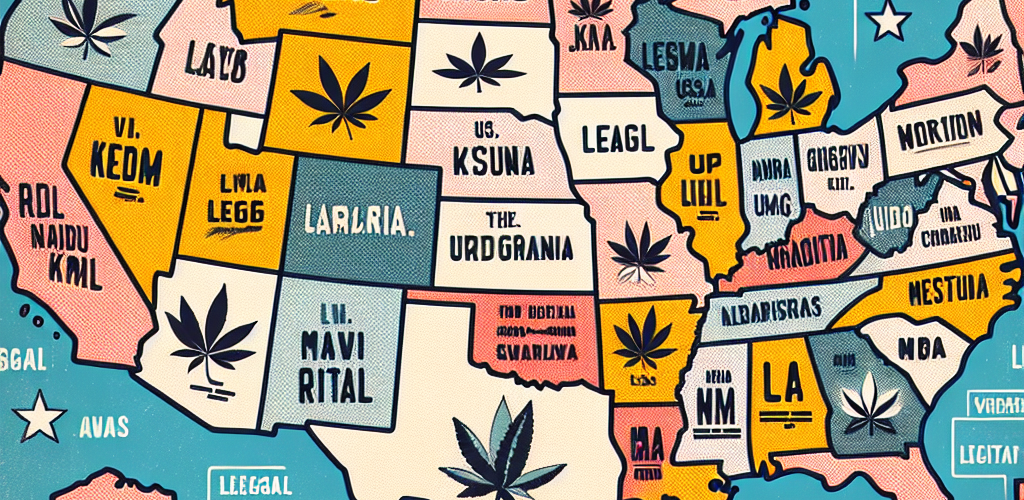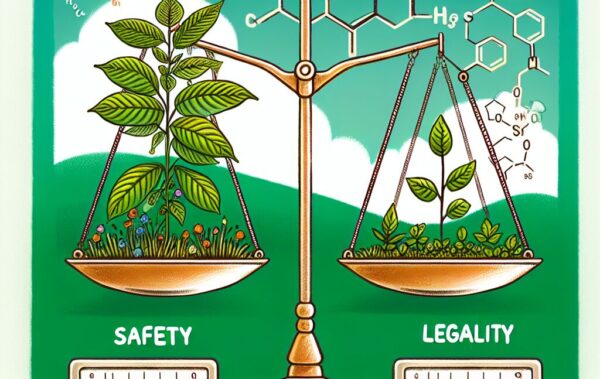- Current federal status of kratom
- Kratom legality by state
- States with pending legislation on kratom
- Recent changes in kratom legislation
- Where to find updated information on kratom legality
Navigating the murky waters of the current federal status of kratom can be quite challenging. Despite ongoing debates and research into the safety and efficacy of this botanical, kratom remains in a curious position with respect to federal law in the United States. As of now, kratom is not regulated under the Controlled Substances Act, which means it is not banned at the national level. However, this doesn’t equate to unlimited freedom for producers and consumers.
The Drug Enforcement Administration (DEA) has previously shown interest in classifying kratom as a Schedule I substance, which would have put it in the same category as heroin, LSD, and cannabis, asserting that it poses significant health risks and has high potential for abuse. Yet, an unprecedented outcry from the public, including petitions, calls to representatives, and input from the scientific community, led to a retraction of this emergency scheduling order in 2016.
The Food and Drug Administration (FDA) has not approved kratom for any medical use, and it has issued warnings regarding its safety. The FDA’s stance reflects concerns about toxicity, potential for abuse, and possible serious health consequences, including death. Without formal FDA approval, kratom cannot be sold for consumption, which forces sellers to market it with disclaimers such as “not for human consumption” or solely for use as botanical specimens.
It’s essential to stay abreast of Kratom Legality Updates since this information can have significant consequences for those operating within the kratom market as well as for consumers. While federal guidelines may not strictly prohibit kratom, regulatory agencies like the FDA continue to seize kratom shipments and warn against its use, thereby influencing its legality and availability.
Additionally, the American Kratom Association (AKA), a significant advocacy group for kratom, has been pushing for regulation through the Kratom Consumer Protection Act (KCPA). This legislation seeks to establish quality controls, age restrictions, and labeling requirements, aiming to ensure safe access to kratom while preventing adulterated and mislabeled products.
For those who seek to comprehend the intricate nuances of State Information, understanding the overarching federal perspective is crucial. While there is no federal ban, the lack of FDA approval and DEA’s dithering past signal the potential for imminent policy shifts. For the time being, kratom remains in the legal gray area at the federal level, relying heavily on import regulations and individual state laws to dictate its distribution and availability.
Kratom legality by state
The patchwork nature of kratom legality in the United States can be puzzling to both consumers and businesses. Each state holds the authority to regulate or ban kratom independently, leading to a range of legal landscapes across the nation. It’s essential for anyone involved with kratom, from enthusiasts to entrepreneurs, to stay informed about these laws that are as varied as they are dynamic.
In some states, kratom is readily accessible and legal without restrictions. For instance, you can buy kratom powder, capsules, or extracts without much concern for legal repercussions. However, in states like Alabama, Arkansas, Indiana, Rhode Island, Vermont, and Wisconsin, kratom is classified as a controlled substance, and its sale and possession are prohibited under state law.
Several states have enacted the Kratom Consumer Protection Act (KCPA), which is aimed at regulating the industry to ensure consumer safety without imposing an outright ban. These regulations might include age restrictions, labeling requirements, and prohibitions on the sale of certain dangerous adulterated kratom products.
A few regions have taken a more nuanced approach, where kratom legality is acceptable at the state level, but individual cities or counties have moved forward with local ordinances that ban or regulate the substance. For example, while kratom is legal in Florida, Sarasota County has passed an ordinance that prohibits the herb.
Effective advocacy and educational efforts often influence the legal status of kratom in various states. The American Kratom Association (AKA) continuously works with legislators and uses scientific evidence to argue in favor of responsible regulation rather than a blanket ban.
In navigating state-by-state nuances, it’s evident that the kratom community must be vigilant and proactive. Here are some key point focuses to consider when understanding kratom legality by state:
- Check for any local kratom bans even if it’s legal in the rest of the state.
- Be aware of age restrictions that may be in place for purchasing kratom.
- Keep informed on any licensing or regulatory requirements for selling kratom in your state.
- Follow the Kratom Legality Updates closely to stay on top of new developments.
- Engage with advocacy groups such as the AKA to support ongoing efforts for fair regulation.
It’s important to remember that this information is continuously evolving. The discussion about kratom laws remains a hot topic in many state legislatures, with proposals for changes regularly being introduced. Given the fluid nature of these laws and the potential consequences for not complying with them, anyone interested in kratom must stay informed. Whether you’re a consumer looking for a legal update or a vendor stocking kratom products, due diligence is crucial in order to navigate the complex legal landscape surrounding kratom in the United States.
States with pending legislation on kratom
When it comes to kratom’s legal terrain, certain states truly keep us on our toes. Amidst the fixed positions for some states, a number of them have legislation pending that could shift the balance of kratom’s legality. For vendors, consumers, and advocates, keeping a vigilant eye on these proceedings is paramount for anyone involved in the industry, as they influence not only current regulations but also foreshadow future state decisions.
In states with pending legislation, proposals vary widely, ranging from initiatives to ban kratom outright to moves intended to introduce regulatory frameworks similar to the Kratom Consumer Protection Act. These pieces of legislation may propose age restrictions, standardization of labeling, and controls over the alkaloid content in kratom products, attempting to create a safer consumer environment.
The American Kratom Association (AKA) keeps a close watch on such pending legislative actions, often providing testimonials, scientific evidence, and consumer experiences to lawmakers. These engagements aim to discourage bans and instead foster regulations that prioritize consumer safety without infringing on access to kratom’s potential benefits.
For instance, states may be debating whether to classify certain kratom alkaloids as controlled substances, which would heavily impact the availability of kratom related products. Any such change can have ripple effects through the local economies, affecting businesses and consumers alike. In such a climate, enactments can occur rapidly, which is why having a source of Kratom Legality Updates can be invaluable for a real-time legal update.
Here are some key points to monitor when considering states with pending legislation on kratom:
- Review any proposed bills or legislative measures that could impact kratom’s status.
- Stay informed about the scheduling of hearings or votes on kratom-related matters.
- Understand the potential repercussions of proposed regulations for both consumers and vendors.
- Contribute to discussions, petitions, or advocacy movements to influence legislative decisions.
- Connect with local advocacy groups or leverage resources provided by national organizations like the AKA to participate in the legislative process.
If you happen to reside in or do business with customers in a jurisdiction with pending legislation, it’s essential to prepare for potential changes. This means understanding the nuances of possible outcomes and adapting your engagement with kratom products accordingly. For the latest and most comprehensive State Information, many turn to reputable online platforms, such as ours, that track kratom laws and legislative actions.
As the social and political landscapes regarding kratom continue to evolve, so do the arguments for and against its regulation. Pending legislation does not only reflect the current sentiment towards kratom within a state but also sets a precedent for future discussions. By staying informed on these matters, the kratom community can react swiftly to changes and contribute positively to the discourse surrounding this natural botanical’s place in our society. Whether it’s a state that might soon join those regulating kratom through the KCPA or another contemplating a restrictive stance, the importance of being up to date remains critical.
Recent changes in kratom legislation
Recent changes in kratom legislation are indicative of the constantly shifting attitudes and regulatory environments surrounding this herbal substance. These modifications to laws and statutes at the state level highlight just how varied the legal landscape can be, and reflect the need for a legal update for anyone involved with kratom.
For example, there have been instances where states that had pending bans on kratom have revisited their stance following active lobbying and advocacy from organizations like the American Kratom Association (AKA) and the broader community. Such efforts have sometimes resulted in a complete reversal of proposed prohibitions, illustrating the effectiveness of grassroots movements and scientific dialogue in shaping public policy. Conversely, kratom may become subject to new regulations in places where it was previously unregulated, sparking discussions about the balance between consumer safety and access to kratom products.
These changes often involve the implementation of certain measures akin to what is presented in the Kratom Consumer Protection Act (KCPA), which seeks to regulate the quality and sale of kratom, ensuring products are pure and unadulterated and sold in a manner that prevents misuse.
To highlight the complexity and provide a clearer overview, let’s delve into some details:
- Certain states have amended their laws, welcoming the tenets of the KCPA, which provides safeguards for consumers while allowing them access to kratom.
- Other states may initiate studies or form committees to better understand the implications of kratom use, sometimes leading to alterations in existing statutes.
- Occasionally, states will revise their controlled substances lists, which can affect kratom’s legal status. For example, a state might remove kratom from a list of banned substances, effectively legalizing it, or the opposite may occur.
Staying current with these legislative updates is essential for those who produce, sell, or consume kratom, as it can influence both the legality and the business operations within the field. Our platform provides consistent kratom legality updates, ensuring that our community has access to the latest state information.
For those seeking to explore the versatile offerings of kratom, from powders and capsules to extracts and edibles, understanding the impact of these recent legislative changes is crucial. It’s worth noting that while some states are opening up the market with new regulations, others may be taking more restrictive measures.
Ultimately, individuals and businesses alike must be proactive in keeping informed and adapting to the changing legal environment to ensure compliance and continued access to kratom. The landscape of kratom laws is a dynamic one, underscoring the importance of reliable, up-to-date legal information. As always, we recommend visiting trusted resources regularly for the most current legal update to navigate the kratom market confidently and responsibly.
Where to find updated information on kratom legality
Seeking out the most current information on kratom legality can seem daunting due to the varying state-by-state regulations and frequent changes in legislative attitude toward the substance. For consumers, vendors, and advocates, the necessity of having a reliable and accurate source for updates cannot be overstated. To ensure that one is operating within legal parameters, accessing updated resources on the legal status of kratom is imperative.
One recommended strategy is to regularly check official state government websites for any announcements or changes in law related to kratom. These sites typically provide the most accurate and authoritative legal updates. In addition, signing up for news alerts or newsletters from these websites can provide real-time updates on any legislative changes.
Another valuable resource would be the websites and communication channels of advocacy groups such as the American Kratom Association (AKA). These organizations work tirelessly to monitor state and federal legislation affecting kratom, and they frequently post legal updates, detailed state information, and call-to-actions when necessary. They also engage with policymakers to promote the responsible use and regulation of kratom, serving as a bridge between the kratom community and legislative bodies.
Forums and online communities dedicated to discussions about kratom also play a crucial role in disseminating information regarding the legal status. Users often share experiences, updates, and even rumors about upcoming legislation, offering a grassroots perspective on how laws are being enforced in different regions.
Moreover, connecting with local establishments that sell kratom-related products can be enlightening. Many kratom shops stay informed about current legislation and upcoming changes to stay compliant with state laws. By conversing with local shop owners, consumers and other stakeholders can tap into the collective knowledge base of the kratom community.
Our platform here at Kratom.Markets continues to be a mainstay in offering Kratom Legality Updates. Beyond providing a marketplace for products, we strive to maintain an up-to-date blog and information portal, sharing legal updates and helpful guides that reflect the current regulatory climate surrounding kratom.
Subscribing to legal newsletters that focus on supplements, botanicals, and natural health products can also supply valuable legal update information. This allows for receiving news summaries from around the country, acting as a general scan for any changes in kratom laws without having to search through every individual state’s legislative updates.
In summary, keeping well-informed requires a multi-faceted approach—using a combination of official government websites, advocacy group updates, and reliable marketplaces with a focus on kratom legislation. By leveraging these resources, one can stay ahead of the changes and ensure they are always in compliance with the latest state information and kratom laws.









